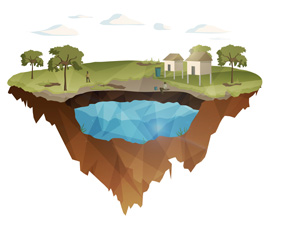Air, land and water are essential shared resources and their good stewardship will only grow more important as the world's population grows. Sharing them responsibly – and being trusted to do so by our neighbours – is critical to our future as a business.
Why is this important to us?
Our steel and mining operations have impacts on land use, on water and on air emissions. The air, land and water we use do not exist in isolation – they are key parts of the natural capital we share with the communities around us, who also use them before, during, and after our business. Those communities rightly expect high standards from our operations on managing those resources. Meeting their expectations is critical to building relationships and trust, and maintaining our social licence to operate.
Our challenge

Our sector depends heavily on natural resources. Mining sites have an impact on extensive areas of land, which later need restoration. Steelmaking and mining create a range of air emissions, including dust, NOx and SOx. Steelmaking also requires large volumes of water – although strategic locations, water reuse and high levels of treatment within processes all means its net impact usually relatively small. Our steel and mining operations may also affect noise and vibration, wastewater and soil protection. Where we don’t get impacts right, our business faces problems and is exposed to the risk of fines or reputational damage.
Our action

We need to continue to invest to reduce air pollution and protect sensitive natural habitats. We must also measure and know the results of what we are doing. We have to continue to bring the perspectives of our stakeholders into our business outlook, understand their concerns, and anticipate new regulations so that we can prevent problems before they arise, and act quickly when they do. We need to ensure we measure our emissions accurately and share this information with our stakeholders, and engage better with them on these challenging issues. This is the only way to build and keep the society’s trust over time.
Our potential to create value

Like any business, we cannot succeed without a social licence to operate. So, earning the trust of stakeholders on environmental issues is essential. But we believe good stewardship of natural resource adds values in other ways, too. We are learning the value of being more open about actual and potential issues, so that we and our stakeholders can build a common understanding of the problems we face. While our operations may have unavoidable impacts on local air, land and water resources, we can create more innovative ways of enhancing improve habitats and protecting biodiversity by seizing the opportunity to work alongside our stakeholders.
